June 19, 2025 | 22:58 GMT +7
June 19, 2025 | 22:58 GMT +7
Hotline: 0913.378.918
June 19, 2025 | 22:58 GMT +7
Hotline: 0913.378.918
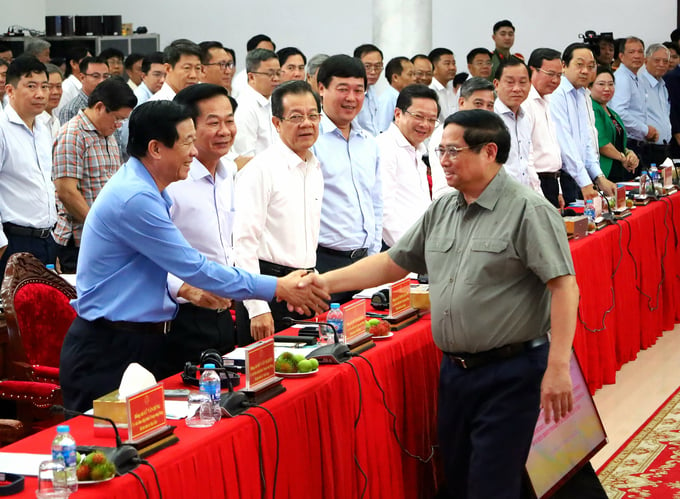
Prime Minister Pham Minh Chinh at the conference discussing solutions to promote and implement the 1 Million hectares of high-quality rice project. Photo: MT.
On October 15, in Can Tho City, Prime Minister Pham Minh Chinh chaired a conference to discuss solutions for promoting and implementing the "Sustainable development of 1 Million hectares of high-quality, low-emission rice cultivation linked to green growth in the Mekong Delta by 2030" (referred to as the project).
Attending the conference were Deputy Prime Minister Tran Hong Ha; Deputy Prime Minister Ho Duc Phoc; leaders of central ministries and agencies; and the Secretary of the Provincial Party Committee, along with leaders of 12 provinces and cities in the Mekong Delta region.
Prime Minister Pham Minh Chinh remarked: “In today's era, with the trend of 'eating well and eating clean', competition is fierce. We must 'infuse spirit' into rice cultivation through digital technology, circular economy, science, technology and innovation. We need to cherish the rice plant as we cherish ourselves, and only then can we create a revolution for rice in the Mekong Delta”.
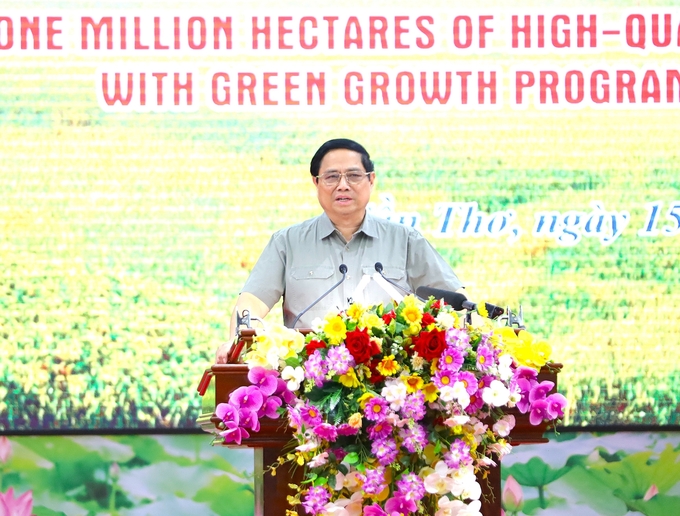
The Prime Minister highly appreciated and welcomed the efforts of the provinces and cities in the Mekong Delta and the Ministry of Agriculture and Rural Development in implementing the 1 Million hectares of high-quality rice project. Photo: MT.
After nearly a year since the issuance of Decision No. 1490/QĐ-TTg (dated November 27, 2023) approving the Project for 1 Million hectares of high-quality rice cultivation, the Prime Minister commended and welcomed the efforts of the provinces and cities in the Mekong Delta and the Ministry of Agriculture and Rural Development (MARD) for overcoming difficulties, improving infrastructure, promoting growth, reducing inflation, along with building and promoting cultural branding.
The Prime Minister urged localities and relevant ministries and agencies to focus on several key issues, including stabilizing raw material area planning, building brand identity, applying science, technology and innovation to enhance the added value of products.
At the same time, it is essential to mobilize and diversify resources from central to local levels, including public-private partnerships, loans, bond issuance, socialization, and community involvement. The use of resources must be scientific and effective, eliminating the “ask-give” mechanism and cumbersome administrative procedures.
In the coming time, the Prime Minister set specific goals for localities to accelerate and further break through in implementing the project, aiming to achieve 14-15 million tons of rice, producing high-quality rice output.
To reach this goal, the Prime Minister proposed 11 solutions, emphasizing the need for stable and long-term raw material area planning for rice cultivation. Localities, along with the Ministry of Agriculture and Rural Development, the Ministry of Natural Resources and Environment, and the Ministry of Planning and Investment, must complete this planning by the second quarter of 2025.
Build strong brands for high-quality rice, along with packaging design, planting area codes and geographical indications.
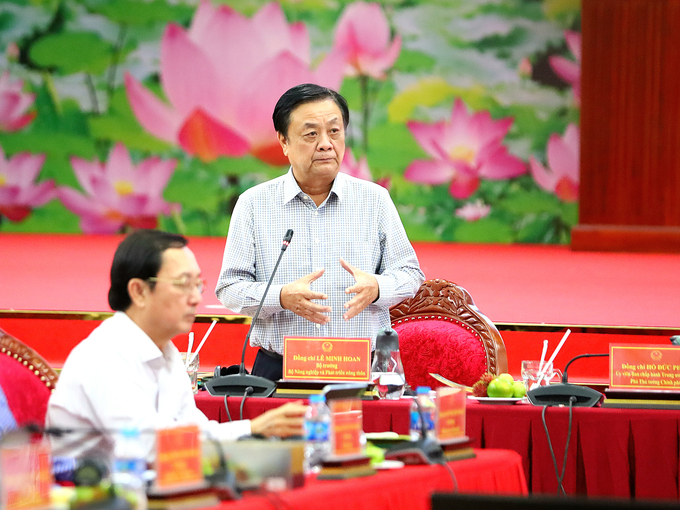
Minister of Agriculture and Rural Development Le Minh Hoan assessed that the 1 Million hectares of high-quality rice project in the Mekong Delta will create a revolution in Vietnam's rice production. Photo: MT.
The Prime Minister also assigned the Ministry of Agriculture and Rural Development to take the lead in collaborating with relevant ministries and agencies to develop preferential policy mechanisms. These proposals should then be submitted to the National Assembly for consideration and inclusion in a resolution.
From now until the end of the year, Prime Minister Pham Minh Chinh emphasized the importance of banks reviewing and expanding preferential credit packages specifically for the rice sector. This initiative aims to facilitate loans for businesses, enabling them to secure necessary materials, seeds, and production capital.
Furthermore, the Prime Minister highlighted the need to establish a dedicated Fund to support the 1 Million hectares of high-quality rice project. This fund would be comprised of various sources, including state capital, funds generated from the sale of carbon credits, and contributions from partners, as well as socialization efforts.
According to the Ministry of Agriculture and Rural Development's assessment, the Ministry has successfully collaborated with local authorities and the International Rice Research Institute (IRRI) to establish 7 pilot models across five provinces and cities, namely Can Tho, Dong Thap, Kien Giang, Tra Vinh and Soc Trang.
As of now, four out of the seven pilot models for the summer-autumn crop of 2024 have reported promising outcomes. Notably, these models have achieved a remarkable reduction in production costs by 20-30%. This reduction has been accomplished through various means, including minimizing the quantities of seeds and nitrogen fertilizers used, decreasing the number of pesticide applications and optimizing irrigation practices.
Moreover, these improvements have led to a 10% increase in yield during the autumn harvest. Farmers involved in these pilot projects have also seen their incomes rise by an additional 20-25%. Furthermore, there has been an average reduction of 5-6 tons of CO2 emissions per hectare.
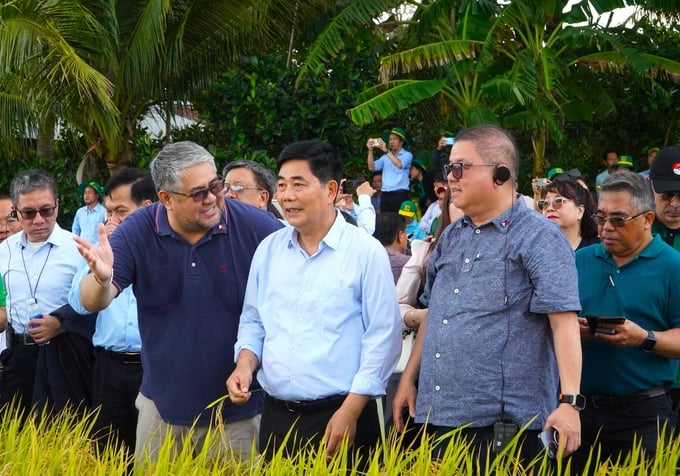
The 1 Million hectares of high-quality rice project in the Mekong Delta is garnering attention from many countries around the world. Photo: Kim Anh.
In particular, all harvested rice output is registered by businesses for consumption at a purchase price higher by approximately 0.0085 - 0.0128 USD/kg.
The results achieved from the pilot models have greatly encouraged farmers and cooperatives to trust and continue actively participating in the project.
Based on this, the Ministry of Agriculture and Rural Development has agreed with localities to continue expanding sustainable farming models that reduce emissions across all 12 provinces and cities in the Mekong Delta and to apply them immediately in the 2024 autumn-winter and 2024-2025 winter-spring crops.
At the same time, the Ministry has collaborated closely with local authorities and experts from the World Bank (WB), along with the International Rice Research Institute (IRRI) to develop a comprehensive measurement, reporting, and verification (MRV) system for greenhouse gas emissions. This system is designed to align with international standards, providing a robust scientific foundation for conducting thorough measurements across all areas participating in the project.
In conjunction with this effort, MARD has partnered with localities to assess the current state of infrastructure. This includes seeking resources to facilitate the investment for upgrading production infrastructure in 33 concentrated agricultural production areas across 12 provinces and cities. These areas encompass 88 districts and 542 communes, covering an expansive total of over 800.000ha, with approximately 540.000 households involved in these agricultural activities.
To accelerate the mobilization of investment capital for this project, the Ministry has formulated a proposal for the project titled "Support for infrastructure and technology for high-quality and low-emission rice in the Mekong Delta", borrowing from the WB, with a total value of 430 million USD. Of this amount, 330 million USD will be sourced as concessional loans, while 100 million USD will come from counterpart funding. The primary objective is to consolidate investment resources for the implementation phase during the years 2026 to 2027. The proposal has been finalized and submitted to the Prime Minister for consideration and approval.
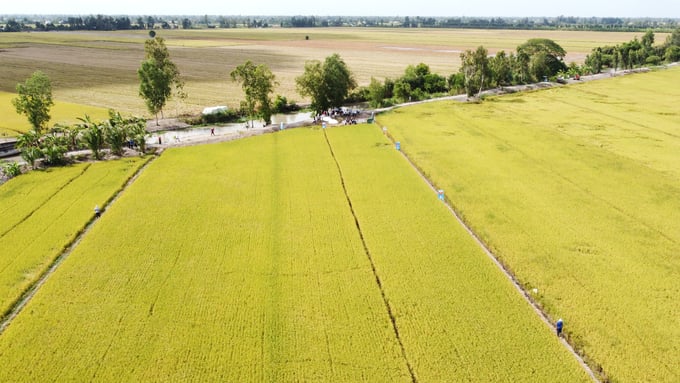
The rice industry contributes to enhancing Vietnam's position and reputation on the international stage. Photo: Kim Anh.
However, at present, the mobilization of investment resources is not keeping up with the required pace. Particularly, budget investment for the 2024-2025 period has not been allocated. This is particularly true for budget allocations, as funding for the 2024-2025 period has not yet been arranged. Looking ahead to the 2026-2030 period, it is essential to prepare investment capital for infrastructure in order to accelerate the preparation and implementation of public investment projects associated under the proposal.
In light of this situation, the Ministry of Agriculture and Rural Development is recommending that the Prime Minister endorse the approach of finalizing the documentation for a pilot special policy related to the public investment program titled "Support for infrastructure and technology for high-quality and low-emission rice in the Mekong Delta". This initiative aims to utilize concessional loan resources from the World Bank, with an estimated amount of approximately 330 million USD.
In the process of finalizing the documentation and issuing a resolution from the National Assembly regarding the pilot special policy, the Ministry of Agriculture and Rural Development will collaborate with the People’s Committees of the 12 provinces and cities, as well as donors, to prepare and complete the necessary documents, ensuring that implementation can commence as early as 2026.
Simultaneously, during the period from 2025 to 2027, the project needs to mobilize approximately 800 million USD. This includes a credit package of around 425 million USD from commercial banks to procure materials, purchase rice, invest in machinery, alonbg with acquire equipment for storage and processing, as well as to develop a system for warehouses and logistics.
To enhance the effectiveness of the project, the Ministry of Agriculture and Rural Development requests that the Prime Minister direct the State Bank of Vietnam to guide and instruct commercial banks to prioritize the allocation of credit packages for loans to farmers, cooperatives, along with enterprises involved in the linkage.
Translated by Phuong Linh

(VAN) Biodiversity is being threatened by traditional remedies made from wildlife. Traditional medicine and humans must change to live in harmony with nature.

(VAN) Agrifood investment and finance solutions for people and the planet.

(VAN) Microplastic contamination has become pervasive in seafood, posing unprecedented challenges for food safety and marine ecosystems.
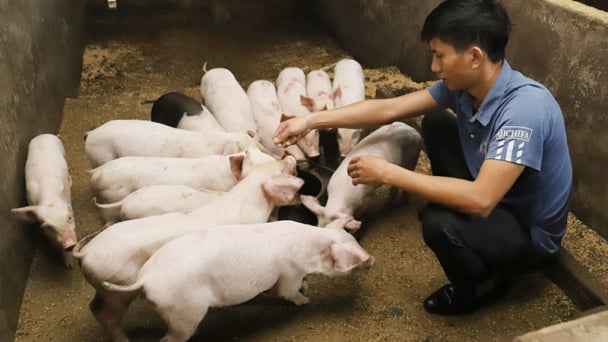
(VAN) Proactively using vaccines, combined with transport control and enhanced surveillance, is the only viable path toward biosecure and sustainable livestock production in Vietnam.
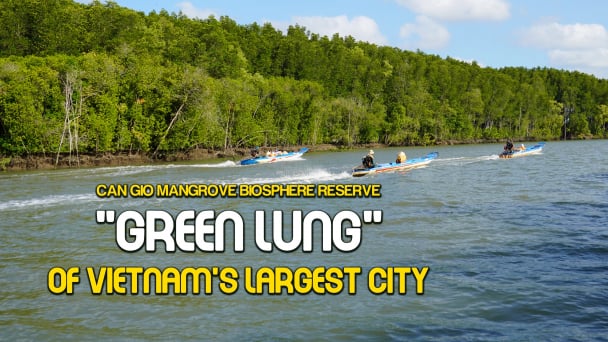
(VAN) Located in the southeast of Ho Chi Minh City, the Can Gio Mangrove Biosphere Reserve is considered the ‘green lung,’ a solid shield protecting the city.

(VAN) To address plastic pollution, closing the plastic recycling cycle will bring significant economic and environmental benefits.

(VAN) According to the Binh Thuan Department of Industry and Trade, in the first five months of 2025, Binh Thuan's dragon fruit export turnover increased by 20.65% compared to the same period last year.